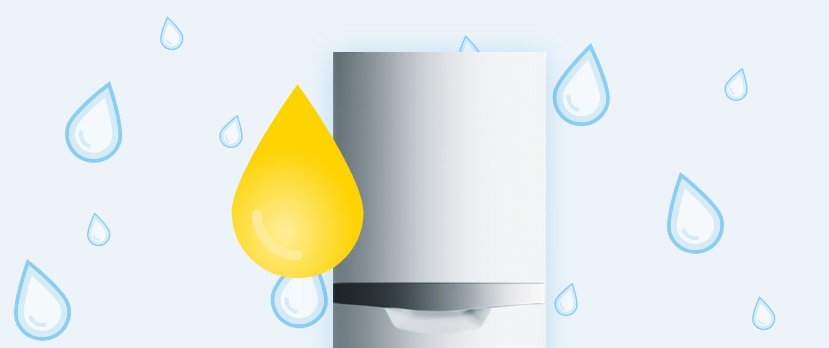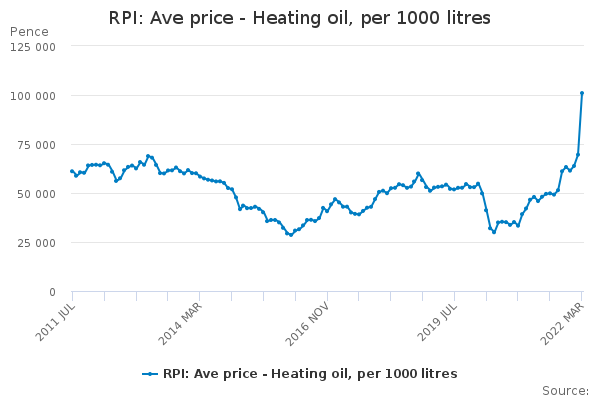New Oil Boiler Replacement: Prices & Installation Costs
- What is an oil boiler?
- Do you need an oil boiler replacement?
- Oil boiler prices
- Are there oil-fired boiler replacement grants available?
- How much does oil boiler installation cost?
- Oil boiler running costs
- Best oil boiler brands and prices
- What size oil boiler do you need?
- Advantages and disadvantages of oil boilers
- Alternatives to oil boiler replacement
- Finding oil boiler installers
- FAQ

Are you looking to enhance the efficiency, safety, and overall comfort of your home? Consider a replacement oil boiler as your solution.
In this guide, we’ll take you through everything you need to consider when it comes to replacement oil boilers, including essential insights into new oil boiler prices. New oil boiler costs start from around £1,000 for the unit with installation adding roughly £500 to £1,000 on top. Keep reading to find out what factors influence these costs, so you can ensure you’re getting the most out of your money.
One critical factor that affects oil boilers prices is the installation cost. Different heating engineers offer different installation rates, depending on factors such as location. Typically, local installers offer more competitive rates compared to nationwide companies.
However, finding trusted heating engineers who are available near you can be tricky. Researching and contacting heating engineers one by one can take up hours of your time and may not even lead to results. Thankfully, Boiler Guide can help you with this.
We can put you in touch with up to 3 qualified heating engineers from our vetted UK network. You’ll receive up to 3 quotes from installers near you which you can then easily compare and choose the best deal. Click the button below to get your free, non-binding quotes now.
Get your best deal
Quickly compare 3 FREE quotes
- Quotes from local engineers
- Get quotes today, installed tomorrow
- Finance options available
- Save up to £500 on installation
- Quotes from local engineers
- Get quotes today, installed tomorrow
- Finance options available
- Save up to £500 on installation

1,8 million quotes provided in 10 years
See more reviews:
What is an oil boiler?
An oil boiler delivers central heating and domestic hot water to a property by burning oil. The oil used by the boiler is stored at the property in a storage tank. This is opposed to natural gas, the most common boiler type in the UK, which is delivered via the mains as and when needed. By storing the oil onsite, oil is a great option for properties that aren't connected to the gas network.
Oil boilers are available as combi, system and regular units. And each of these oil boiler types has its own set of pros and cons that make them suited to different property types.
Oil combi boilers
Oil combi boilers are single cost-effective heating systems that provide central heating and hot water on demand. This means that other than the oil storage tank, there's no need for any additional tanks or cylinders. While this makes them great for small to medium sized homes, oil combi boilers will struggle to meet the higher hot water demands of properties with multiple bathrooms. If you have more than 2 bathrooms, a system or regular boiler would be a more suitable option as they store hot water in a cylinder.
Oil system boilers
An oil system boiler directly heats the central heating system and stores domestic hot water in a cylinder. They receive a supply of water directly from the mains, removing the need for a cold water tank in the loft which is essential for regular boilers. This puts system boilers in between combi and regular boilers in terms of how they operate.
Oil regular boilers
Regular oil boilers are the oldest boiler type, most commonly found in large traditional properties. Rather than taking water directly from the mains, like combi and system boilers, regular boilers are fed water by a cold water storage tank in the loft. They directly heat the central heating system while storing domestic hot water in a cylinder.
It's widely recommended that you should only have a regular boiler installed if your existing heating system already includes a regular boiler. This is known as a like-for-like boiler swap.
No matter which type of oil boiler you have installed, a storage tank will need to be fitted in an outdoor area.
Do you need an oil boiler replacement?
 Eventually, your boiler will reach a point where it won't be able to perform as well as it once did. This could be in terms of boiler efficiency, reliability or overall performance.
Eventually, your boiler will reach a point where it won't be able to perform as well as it once did. This could be in terms of boiler efficiency, reliability or overall performance.
By reading this article, it's likely that you're already considering a new oil boiler. If you're not sure, here are some signs that it's time for an oil boiler replacement:
- Your current boiler was installed more than 10 years ago
- It's less efficient than it used to be which has seen your heating bills rise
- You have a noisy boiler or heating system that’s making some unusual sounds.
- Constantly running into issues
- Heating engineers have a hard time finding replacement parts
- Your home isn't as warm and comfortable as it once was
Find out if it’s time for a new boiler in our complete new boiler and installation guide. If you’re ready to find a brand new oil boiler though, and are looking for a free, easy way to access quotes – simply click the link below!
Get your best deal
Quickly compare 3 FREE quotes
- Quotes from local engineers
- Get quotes today, installed tomorrow
- Finance options available
- Save up to £500 on installation
- Quotes from local engineers
- Get quotes today, installed tomorrow
- Finance options available
- Save up to £500 on installation

1,8 million quotes provided in 10 years
See more reviews:
Oil boiler prices
The cost of a new oil boiler typically falls within a range of £1,000 to £4,500, with an average price of around £2,500.
| Oil boiler costs | ||
|---|---|---|
| Combi oil boiler cost | System oil boiler cost | Conventional oil boiler cost |
| £1,500 – £4,500 | £1,300 – £3,200 | £1,000 – £3,000 |
These oil boiler costs are averages and exclude installation and labour costs. Get a local installer to QUOTE now!
The cost of an oil boiler will change depending on the manufacturer. Below, we’ve broken down the potential oil boiler costs for the top oil boiler manufacturers on the market for each boiler type.
Oil combi boiler prices
Oil combi boiler prices can range from the £1,000 mark to well above £4,000. Individual oil combi boiler pricing will vary depending on the manufacturer and model. The oil combi boiler prices in the table below show that the most affordable models are manufactured by Firebird and Warmflow.
| Oil Combi Boiler Manufacturer | Potential Oil Boiler Costs (excluding installation) |
|---|---|
| Firebird | £1,300 – £2,575 |
| Grant | £1,500 – £3,105 |
| Mistral | £1,710 – £4,596 |
| Warmflow | £1,800 – £2,900 |
| Worcester Bosch | £1,500 – £2,600 |
These oil boiler costs don’t take into account the cost of installing central heating. These costs are averages. Get a local installer to QUOTE now!
Oil system boiler prices
Oil system boilers need to be installed as part of a heating system which also includes a hot water cylinder. So in addition to the oil boiler costs, you will need to keep that in mind too. The price of the oil system boiler itself typically comes to between £1,000 and £3,000.
| Oil System Boiler Manufacturer | Potential Oil Boiler Costs (excluding installation) |
|---|---|
| Firebird | £1,555 – £2,225 |
| Grant | £1,300 – £2,100 |
| Mistral | £1,300 – £3,200 |
| Navien | £1,000 – £3,000 |
| Viessmann | £1,000 – £3,000 |
| Warmflow | £1,175 – £1,650 |
| Worcester Bosch | £1,700 – £2,700 |
These costs are averages. Get a local installer to QUOTE now!
Oil regular boiler prices
A regular boiler that runs on oil needs to be installed as part of a fairly complex heating system. This means that the oil boiler costs will rise from the typical £1,000 – £3,000 for the unit if the tanks or cylinder needs replacing too.
| Oil Regular Boiler Manufacturer | Potential Oil Boiler Costs (excluding installation) |
|---|---|
| Firebird | £1,120 – £2,900 |
| Grant | £1,255 – £2,605 |
| Mistral | £1,000 – £3,250 |
| Navien | £1,000 – £3,000 |
| Warmflow | £1,045 – £1,800 |
| Worcester Bosch | £1,430 – £2,400 |
These costs are averages. Get a local installer to QUOTE now!
If you’re in need of a new oil boiler and are confused about prices or which model is best for you, we can help! To take the stress out of endless research and company reviews, just one click of a button can do it all for you.
Our team is on hand right now to find you up to 3 FREE quotes from our professional engineers, who can offer you the very best advice and competitive prices. So you can find the perfect new boiler for your home, without the hassle! The best part is, it’s completely free and there’s no obligation to accept any of the quotes. So what are you waiting for?
Get your best deal
Quickly compare 3 FREE quotes
- Quotes from local engineers
- Get quotes today, installed tomorrow
- Finance options available
- Save up to £500 on installation
- Quotes from local engineers
- Get quotes today, installed tomorrow
- Finance options available
- Save up to £500 on installation

1,8 million quotes provided in 10 years
See more reviews:
Are there oil-fired boiler replacement grants available?
Replacing an oil boiler is not cheap. Depending on the type of boiler and installation costs, you may end up paying more than £4,000. However, there are a few government boiler grants available. They can help you economise on a new oil-fired boiler. Sometimes, it is even possible to get a new one for free. You will need to meet several conditions, though.
Energy Company Obligation (ECO4)
Beneficiaries can expect to have the costs of a new boiler (partially) covered.
This scheme is available to homeowners and tenants renting privately in England, Scotland and Wales. They also need to be in receipt of the following qualifying benefits:
- Pension Credit
- Child Tax Credit (on an income of £16,010 or less)
- Working Tax Credit (on an income of £16,010 or less)
- Income Support
- Income-based Job Seeker’s Allowance
- Universal Credit with a monthly earned income of £1,250 or less in any assessment period in the last 12 months.
Additional requirements may apply to different situations. Read our article on the ECO boiler scheme in 2025 to check if you qualify.
CLOSED: Boiler Replacement Scheme (not to be confused with the Boiler Upgrade Scheme)
Eligible homeowners received grant aid of up to £1,000, depending on their financial circumstances.
The scheme aimed to help homeowners with the cost of replacing old boilers. You may have qualified if you:
- Live in Northern Ireland
- Own and occupy your property as your main home
- Have a gross household income of less than £40,000 per year
- Have a boiler which is at least 15 years old
This grant closed in September 2023.
Boiler Upgrade Scheme
This is a new government grant scheme designed to help homeowners fund the upgrade of their heating systems to low-carbon options such as heat pumps or biomass boilers. The application period opened on 23rd May, 2022, and will run until 2028. Successful applicants will receive a grant of up to £6,000.
You may qualify if you:
- Live in England or Wales and own your property.
- Are replacing an existing fossil fuel system (e.g. gas/oil boiler).
- Have a valid Energy Performance Certificate (EPC) for the property, with no outstanding recommendations for improvement (e.g. loft/wall insulation).
Additionally, the property must have an installation capacity of up to 45kWth (kilowatt thermal). You can find more information in our article on the Boiler Upgrade Scheme (formerly the Clean Heat Grant).
How much does oil boiler installation cost?
In total, new replacement oil boiler prices, including installation, could cost between £2,500 - £4,500.

The cost of an oil boiler installation for each of these boilers will vary from installer to installer so we highly recommend comparing multiple quotes to give you the greatest chance of finding the most competitive price.
On average, you can expect to pay anything from £500 - £2,000 for the labour and installation of your new boiler with the total being affected by a number of factors.
Level of labour
No two oil boiler installations are the same and the amount of work needed will have an impact on the final price. For example, if your job requires extra pipework, relocating a flue, replacement radiators or the removal of cylinders / water tanks, then you'll inevitably have a higher bill from the installer.
Converting to a different boiler type
If your current boiler struggles to meet the demand for central heating or domestic hot water, you might want to consider an alternative boiler type. Whilst it would be worthwhile, it will make the installation of a new oil boiler more complex. The more complex the installation, the more it's likely to cost.
Converting from one boiler type to another can be more complex as the pipework may need to be altered. It can also involve the installation or removal of tanks and cylinders depending on the boiler types involved.
Most like-for-like oil boiler swaps can be completed by an OFTEC technician within a single day. More complex installations, such as replacing a regular boiler with a combi could potentially take as long as 3 days.
Moving boiler to a new location
When comparing oil boilers, you'll find that many manufacturers have models designed for internal or external installation. So, if you've found that your current boiler gets in the way, you might prefer an external oil boiler. And when it comes to internal oil boiler installation, you're not limited to fitting it in a kitchen or utility room. Boilers can be installed in a loft, garage or even a bedroom. However, moving the boiler to a new location will increase the time it takes to complete the installation and add the cost to move the boiler to the total sum.
Replacing the oil storage tank
A tank to store the oil is an essential part of an oil boiler installation. Over time, the condition of the tank can deteriorate and begin to rust away. As the owner of an oil storage tank, it's your responsibility to ensure that oil isn't able to leak out and make its way into the environment. Should oil leak out at any point, you will have to pay for it to be cleaned up as well as covering the cost of any damages.
As well as oil leaking out, damage to the tank can allow other substances into the oil. For example, if water is allowed into the tank it can carry dirt or lead to freezing.
If the storage tank isn’t up to standard then the OFTEC technician may refuse to carry out the oil boiler replacement without an oil tank replacement being installed
Powerflush of the heating system
A Powerflush of the heating system before the new boiler is installed typically costs around £300 - £500. It is also often recommended that you install a new magnetic filter to trap sludge, dirt and debris to keep your system working at optimum efficiency for longer.
Thermostatic Radiator Valves
Thermostatic Radiator Valves (TRVs) give you the ability to control the heat output from the individual radiators around your home - giving you the power to prevent radiators not needed at the time from turning on. Having TRVs installed will help to keep your energy bills down and there's no better time to have them fitted than during a new boiler installation.
Oil boiler running costs
As oil needs to be stored in a tank it's recommended to purchase it in bulk. Since 2016, the price of oil (per litre) has gradually been on the rise. Whilst prices dropped briefly in 2020, the price of oil has been rising again in recent years as a result of global events.

Office for National Statistics, 2022
So, how does the price of oil compare with other fuels?
The best way to look into this is by comparing the cost per kilowatt hour (kWh). A kilowatt hour is a measurement of how much energy is being used in an hour. According to the Energy Saving Trust the average price of oil in England, Scotland and Wales is 9p/kWh. In Northern Ireland, the price drops to 6.9p/kWh.
This makes oil more affordable than electricity (30p/kWh in Great Britain). Natural gas remains the cheapest way to heat your home (8p/kWh in Great Britain). This isn't including renewable energy sources, such as solar, which are 'free' ways to generate energy.
In the table below, you can see a summary of the fuel prices for Great Britain:
| Fuel | Fuel Prices (pence/kWh) |
|---|---|
| Gas | 8 |
| Oil | 9 |
| Electricity (Standard Rate) | 30 |
| Wood Pellets | 13.8 |
Source: The Energy Saving Trust, July 2023
If you were to install a 24 kW oil boiler, it will use 24 kWh for each hour that it operates. So if you were paying the average of 9p/kWh this would cost roughly £2.16 to heat your home for an hour.
You can work out the potential oil boiler running costs of your home using annual kWh and price per kWh being paid for oil. You can find out how much energy your home uses each year on your energy bill. To give you an idea, we've put typical annual usages based on house size in the table below.
| Number of Bedrooms | Average Annual Heating Usage | Potential Annual Cost of Heating Home with Oil (9p/kWh) |
|---|---|---|
| 1-2 | 8,000 kWh | £720.00 |
| 3 | 12,000 kWh | £1,080.00 |
| 4+ | 17,000 kWh | £1,530.00 |
Working out the costs of a new oil boiler can be tricky, particularly if you’re not sure what type of boiler you need or which brand would best suit your home. Luckily, our friendly team here at Boiler Guide can help you find all the answers you need.
By clicking the link below, we can help you find the very best advice from professional heating engineers in your area. They can provide you with up to 3 FREE, no-obligation quotes and can have you on track to install a brand new boiler in no time! Single click below to find out more.
Get your best deal
Quickly compare 3 FREE quotes
- Quotes from local engineers
- Get quotes today, installed tomorrow
- Finance options available
- Save up to £500 on installation
- Quotes from local engineers
- Get quotes today, installed tomorrow
- Finance options available
- Save up to £500 on installation

1,8 million quotes provided in 10 years
See more reviews:
Best oil boiler brands and prices
The best oil boilers for home heating in the UK are manufactured by Firebird, Grant, Mistral, Warmflow and Worcester Bosch. The leading oil boiler ranges from each of these manufacturers are highly efficient and include multiple output ratings to give a suitable option for a variety of property types.
| Best Oil Boiler | Central Heating Output Ratings (kW) | ErP Space Heating Efficiency | Standard Warranty | Potential Cost (excluding installation) |
|---|---|---|---|---|
| Worcester Bosch Greenstar Heatslave II | 18, 25, 32 | 90% | Up to 2 years | £2,350 – £2,800 |
| Grant Vortex Blue | 21, 26, 36 | 90.8% – 94.5% | 2 years | £1,500 – £3,100 |
| Mistral Combi Standard CC | 20, 26, 35 | 92% | 2 years | £1,920 – £2,400 |
| Firebird Envirogreen Combipac | 20, 26, 35 | 93% | 2 years | £2,200 – £2,600 |
| Warmflow Agentis Internal Combi | 21, 26, 33 | AAA | 5 years | £2,170 – £2,500 |
These costs are averages. Get a local installer to QUOTE now!
The Grant VortexBlue, Greenstar Heatslave II and Warmflow Agentis ranges also include models that can be installed externally or in garages/outhouses. You might want to consider an external oil boiler if there isn't much room in your property. Having said that, the oil storage tank will have to be outdoors too so plenty of room will be needed if you plan to have both installed externally.
What size oil boiler do you need?
 Boiler size is one of the most important things to get right when looking for a replacement oil boiler. Boiler size is otherwise known as the output rating and shows the maximum power of the unit. Measured in kilowatts (kW), a higher output rating will be needed to meet higher demands for central heating.
Boiler size is one of the most important things to get right when looking for a replacement oil boiler. Boiler size is otherwise known as the output rating and shows the maximum power of the unit. Measured in kilowatts (kW), a higher output rating will be needed to meet higher demands for central heating.
System and regular boilers both only have central heating (CH) output ratings. Combi boilers however also have a domestic hot water (DHW) output rating as they directly deliver hot water to the taps.
Property size is the biggest factor in determining an appropriate output rating for your home. Using the number of bathrooms and radiators you have, along with the total number of people living in the property, a suitable output rating can be found.
| Number of Radiators | Combi Boiler Central Heating Output Rating | System Boiler Central Heating Output Rating | Regular Boiler Central Heating Output Rating |
|---|---|---|---|
| Up to 10 | 24-27 kW | 9-18 kW | 9-18 kW |
| 10-15 | 28-34 kW | 18-26 kW | 18-26 kW |
| 15-20 | 35-42 kW | 27-40 kW | 27-40 kW |
Take a look through What Size Boiler Do I Need for a complete guide to boiler sizing.
Advantages and disadvantages of oil boilers
The main advantage of oil boilers is that they're a reliable and efficient alternative to gas. And for homes without a connection to the gas network, oil only costs slightly more. Plus, unlike with natural gas, you can bulk buy and be well stocked up should prices rise.
Oil boiler advantages
- An efficient and effective heating system for the 4 million properties that aren't connected to the gas network
- The efficiency of oil boilers has come along way in recent years and modern units deliver efficiencies of over 90% – similar levels to natural gas boilers
- Oil boilers can be installed alongside a renewable heating system such as solar thermal panels or a heat pump
Upgrading an old, inefficient oil boiler to a modern condensing version has many benefits including a significant improvement in your safety. They are also far more energy efficient which reduces both your energy bills and carbon footprint.
- Cheaper bills through improved efficiency
- More effective heating performance means a more comfortable home
- Energy efficiency is a great selling point if you ever sell your home in the future
- Lower carbon emissions reduces your home's impact on the environment
Choose an oil combi boiler and the list of benefits continues to grow:
- Heating and hot water on demand
- Compact design
- Quick and easy installation
- User-friendly controls
- No water tank in the loft (essential for a regular boiler)
- No need for a hot water cylinder (necessary when having a system or regular boiler installed)
Modern condensing combi oil boilers can convert at least 90% of fuel into heat. Some older boilers can be as inefficient as 50%, meaning that half of the fuel you pay for is not actually used to heat your home. Such a significant improvement in efficiency means you should lose significantly less money through wasted energy and could reduce your energy bills by as much as £600 a year.
If an oil boiler sounds like the perfect choice for you, why not try our free, no-obligation quote service and find up to 3 installers in your area who can get the job done for you! It’s quick, easy and totally free – click the link below to get started.
Get your best deal
Quickly compare 3 FREE quotes
- Quotes from local engineers
- Get quotes today, installed tomorrow
- Finance options available
- Save up to £500 on installation
- Quotes from local engineers
- Get quotes today, installed tomorrow
- Finance options available
- Save up to £500 on installation

1,8 million quotes provided in 10 years
See more reviews:
Oil boiler disadvantages
- The installation of a new oil boiler can be disruptive, particularly if you've never had one installed before
- An oil storage tank will take up space in the garden and can be an eyesore
- Most oil boilers are designed for floor-standing installation with wall-mounted units often hard to find
- The price of oil does fluctuate and tends to rise in the winter so it's important to plan ahead in terms of filling the oil storage tank
- Oil boilers aren't the most environmentally friendly heating systems. Oil, like gas, is a fossil fuel and when burned it produces waste gases that are emitted out into the atmosphere. It's estimated that around 14% of all UK carbon emissions come from home heating as a result of using fossil fuels.
If you are concerned about the emissions as a result of heating your home with oil, you might want to consider an alternative heating system.
Alternatives to oil boiler replacement
An oil boiler isn't the only option for off-grid properties. Other fuels that can be stored onsite include liquefied petroleum gas (LPG) and biomass boilers. LPG is propane or butane, a fossil fuel that differs from natural gas as it can be stored. Biomass, on the other hand, comes from plant based organisms such as wood pellets, chips or logs. As biomass is a solid material, biomass boilers are much larger than oil, LPG and gas boilers.
On average, oil is more affordable than LPG in Northern Ireland and roughly the same price in Great Britain (as of July 2023). However, wood pellets can be found for around 13.8p/kWh in Great Britain and 9.1p/kWh in Northern Ireland.
| Fuel | Average Fuel Price (pence/kWh) |
|---|---|
| Oil | 9 |
| LPG | 8.7 |
| Wood pellets | 13.8 |
Source: The Energy Saving Trust (England, Scotland, Wales)
Biomass boilers are a form of renewable heating system as they use natural materials that are sustainable and more environmentally friendly than fossil fuels.
Other renewable heating systems include heat pumps and solar thermal panels. These harness sustainable energy from the air, ground or sun and convert it into usable energy. While the units tend to be more expensive than oil, gas or LPG boilers, they don't require fuel and you can receive a grant through the Boiler Upgrade Scheme for heat pumps.
Heat pumps
There are two main types of heat pump: air source and ground source.
Air source heat pumps extract heat from the air outside. Some models can even do this in temperatures as low as -20°C. This air passes over an exchanger coil where a refrigerant fluid is boiled and evaporates, turning into vapour. The vapour is then compressed at high temperatures to produce heat which warms up the central heating system.
Ground source heat pumps work in a similar way but rather than taking heat from the air, it's extracted from the ground. At 15-100 metres below ground level, temperatures sit at a constant 10-15°C which can be harnessed by a ground source heat pump. To extract this heat, pipes are buried in the ground either vertically or horizontally (depending on the room available).
Solar thermal
Solar thermal panels use solar energy to heat the water stored in a hot water cylinder. So, if you're having a system or regular oil boiler installed, you could take some of the strain off the boiler during the day. The hot water cylinder must be solar compatible and contain an immersion heater. Hot liquid from the solar thermal panels circulates through the immersion heater, which is within the water of the cylinder, to heat the stored water.
Finding oil boiler installers
When looking for an oil boiler installer, you should aim to hire one who is approved by OFTEC. The Oil Firing Technician Association (OFTEC) is a scheme that recognises installers approved to install oil boilers. While it isn't a legal requirement for an oil boiler and storage tank to be installed by an OFTEC approved installer, it's highly recommended.
Hiring an installer who isn't OFTEC approved can be a hassle. They have to notify the local authority's building control department before the work can begin and then, once installed, an OFTEC technician will be needed to check if the installation meets regulations. So, if you don't hire an OFTEC registered engineer the first time round you will need one in the end.
We can match you with OFTEC approved engineers who are fully qualified to carry out an oil boiler installation. All you need to do is complete our simple online form – which should only take a few moments. All we need to know are a few details about your property type and the work involved. You'll then be hearing from up to 3 OFTEC installers as soon as possible.
Compare oil boiler installation quotes
We match you with up to 3 installers because it's important to compare quotes when having a new oil boiler installed. If you were to accept the first and sole quote you receive, you wouldn't know if you were getting a competitive price. By comparing at least 3 oil boiler installation quotes, you'll have the peace of mind that you're getting the best price from the most suitable company.
Best of all, the quotes you receive from companies through Boiler Guide are completely free. Plus, there's no-obligation to accept any of the quotes you receive.
Get your best deal
Quickly compare 3 FREE quotes
- Quotes from local engineers
- Get quotes today, installed tomorrow
- Finance options available
- Save up to £500 on installation
- Quotes from local engineers
- Get quotes today, installed tomorrow
- Finance options available
- Save up to £500 on installation

1,8 million quotes provided in 10 years
See more reviews:
FAQ
How much does it cost to replace an oil-fired boiler?
A new replacement oil boiler, including installation, could cost between £2,500-£4,500. The total price depends on factors such as the brand, boiler type and size, installer’s rates, etc.
Can I get a grant to replace my oil boiler?
Yes, a few government grants, such as the ECO4, can help you replace your oil boiler. To be eligible for the grants you need to meet several requirements.
When should you replace an oil boiler?
The following may mean it’s time for an oil boiler replacement: your current boiler was installed over 10 years ago or your heating bills are higher, unusual sounds coming from the boiler or heating system, or if your boiler is constantly running into issues.
Are oil boilers worth upgrading?
You will always benefit from upgrading your old oil boiler to a more efficient one – the more efficient your oil boiler is, the lower its running costs.
Can I replace my oil boiler myself?
An OFTEC registered engineer should be the one who carries out an oil boiler replacement. You may contact a Gas Safe registered engineer if you are replacing your oil boiler with a gas boiler.
Get your best deal
Quickly compare 3 FREE quotes
- Quotes from local engineers
- Get quotes today, installed tomorrow
- Finance options available
- Save up to £500 on installation
- Quotes from local engineers
- Get quotes today, installed tomorrow
- Finance options available
- Save up to £500 on installation

1,8 million quotes provided in 10 years
See more reviews:
Article Contributor
Luis A Gómez Pérez

Edited by
Hannah Maza




